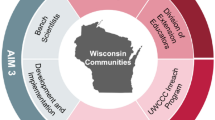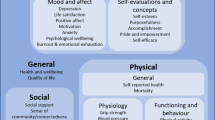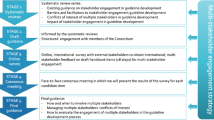Abstract
Hispanics are under-represented in clinical research. To ensure that the Hispanic population benefits from advances in public health and medicine, including personalized medicine, there is a need to increase their participation in clinical trials and biobanking. There is a great need for improving awareness and addressing concerns individuals may have about participation. The purpose of this study was to adapt, implement, and evaluate educational materials about clinical trials and biobanking for Hispanic individuals. We adapted existing materials based on focus group data. We then trained four promotoras de salud to deliver education to Hispanic adults in community settings in Houston, TX. The promotoras educated 101 Hispanic adults, 51 on biobanking and 50 on clinical trials. Study staff administered brief pre- and post-test questionnaires that measured benefits, barriers, norms, self-efficacy, and intention to participate in either clinical trials or biobanking. Our sample was predominately female (83%) and Spanish-speaking (69%) and made less than $25,000 a year (87%). This intervention increased perceived benefits of participating in biobanking and clinical trials, self-efficacy for donating biospecimens, and intention to participate in biobanking if invited. Perceived barriers to participating declined. This study demonstrated that brief education can result in improved perceptions and attitudes related to participation in biobanking and clinical trials, and could increase participation. Researchers and practitioners could use these educational materials to educate Hispanic community members on clinical research potentially increasing participation rates in the future.
Similar content being viewed by others
References
Gehlert SJ (2016) Abstract IA40: maximizing the benefits of precision medicine for cancer disparities. AACR
Popejoy AB, Fullerton SM (2016) Genomics is failing on diversity. Nature 538(7624):161–164
Simon MA, de la Riva EE, Bergan R, Norbeck C, McKoy JM, Kulesza P, Dong XQ, Schink J, Fleisher L (2014) Improving diversity in cancer research trials: the story of the Cancer Disparities Research Network. J Cancer Educ 29(2):366–374
Chen MS et al (2014) Twenty years post-NIH Revitalization Act: enhancing minority participation in clinical trials (EMPaCT): laying the groundwork for improving minority clinical trial accrual. Cancer 120(S7):1091–1096
Fisher JA, Kalbaugh CA (2011) Challenging assumptions about minority participation in US clinical research. Am J Public Health 101(12):2217–2222
Haga SB (2010) Impact of limited population diversity of genome-wide association studies. Genet Med 12(2):81–84
Scott EA, Schlumpf KS, Mathew SM, Mast AE, Busch MP, Gottschall JL, for the National Heart, Lung, and Blood Institute Retrovirus Epidemiology Donor Study-II (REDS-II) (2010) Biospecimen repositories: are blood donors willing to participate? Transfusion 50(9):1943–1950
Parra A, Karnad AB, Thompson IM (2014) Hispanic accrual on randomized cancer clinical trials: a call to arms. J Clin Oncol 32(18):1871–1873
Siegel RL, Miller KD, Jemal A (2016) Cancer statistics, 2016. CA Cancer J Clin 66(1):7–30
Murthy VH, Krumholz HM, Gross CP (2004) Participation in cancer clinical trials: race-, sex-, and age-based disparities. Jama 291(22):2720–2726
Arevalo M, Heredia NI, Krasny S, Rangel ML, Gatus LA, McNeill LH, Fernandez ME (2016) Mexican-American perspectives on participation in clinical trials: a qualitative study. Contemp Clin Trials Commun 4:52–57
Heredia NI, Krasny S, Strong LL, von Hatten L, Nguyen L, Reininger BM, McNeill LH, Fernández ME (2017) Community perceptions of biobanking participation: a qualitative study among Mexican-Americans in three Texas cities. Public Health Genomics 20(1):46–57
Dang JH et al (2014) Engaging diverse populations about biospecimen donation for cancer research. J Community Genet 5(4):313–327
Ford JG, Howerton MW, Lai GY, Gary TL, Bolen S, Gibbons MC, Tilburt J, Baffi C, Tanpitukpongse TP, Wilson RF, Powe NR, Bass EB (2008) Barriers to recruiting underrepresented populations to cancer clinical trials: a systematic review. Cancer 112(2):228–242
Calderón JL, Baker RS, Fabrega H, Conde JG, Hays RD, Fleming E, Norris K (2006) An ethno-medical perspective on research participation: a qualitative pilot study. Medscape Gen Med 8(2):23
George S, Duran N, Norris K (2014) A systematic review of barriers and facilitators to minority research participation among African Americans, Latinos, Asian Americans, and Pacific Islanders. Am J Public Health 104(2):e16–e31
Curbow B, Fogarty LA, McDonnell K, Chill J, Scott LB (2004) Can a brief video intervention improve breast cancer clinical trial knowledge and beliefs? Soc Sci Med 58(1):193–205
Jacobsen PB, Wells KJ, Meade CD, Quinn GP, Lee JH, Fulp WJ, Gray JE, Baz RC, Springett GM, Levine RM, Markham MJ, Schreiber FJ, Cartwright TH, Burke JM, Siegel RD, Malafa MP, Sullivan D (2012) Effects of a brief multimedia psychoeducational intervention on the attitudes and interest of patients with cancer regarding clinical trial participation: a multicenter randomized controlled trial. J Clin Oncol 30(20):2516–2521
Manne S, Kashy D, Albrecht T, Wong YN, Flamm AL, Benson AB III, Miller SM, Fleisher L, Buzaglo J, Roach N, Katz M, Ross E, Collins M, Poole D, Raivitch S, Miller DM, Kinzy TG, Liu T, Meropol NJ (2014) Knowledge, attitudes, and self-efficacy as predictors of preparedness for oncology clinical trials: a mediational model. Med Decis Mak 34(4):454–463
Ellington L, Wahab S, Sahami Martin S, Field R, Mooney KH (2006) Factors that influence Spanish-and English-speaking participants’ decision to enroll in cancer randomized clinical trials. Psycho-Oncology 15(4):273–284
Gao W, Ma GX, Tan Y, Fang C, Weaver J, Jin M, Lai P, Godwin AK (2014) Culturally appropriate education intervention on biospecimen research participation among Chinese Americans. Cancer Epidemiol Prev Biomarkers 23(3):383–391
Ma GX et al (2013) The impact of a community-based clinical trial educational intervention among underrepresented Chinese Americans. Cancer Epidemiol Prev Biomarkers p. cebp. 0773.2013
Thompson B, Hébert JR (2014) Involving disparate populations in clinical trials and biobanking protocols: experiences from the Community Network Program Centers. Cancer Epidemiol Prev Biomarkers 23(3):370–373
Ford M et al (2012) Assessing an intervention to improve clinical trial perceptions among predominately African-American communities in South Carolina. Prog Community Health Partnersh 6(3):249
Frew PM et al (2015) Results of a community randomized study of a faith-based education program to improve clinical trial participation among African Americans. Int J Environ Res Public Health 13(1):41
Banda DR, Libin AV, Wang H, Swain SM (2012) A pilot study of a culturally targeted video intervention to increase participation of African American patients in cancer clinical trials. Oncologist 17(5):708–714
McIntyre J et al (2017) Comparison of health communication channels for reaching Hispanics about biobanking: a pilot trial. J Cancer Educ:1–9
Wells KJ, McIntyre J, Gonzalez LE, Lee JH, Fisher KJ, Jacobsen PB, Meade C, Muñoz-Antonia T, Quinn GP (2013) Feasibility trial of a Spanish-language multimedia educational intervention. Clin Trials 10(5):767–774
Riegman PH, Morente MM, Betsou F, de Blasio P, Geary P, Marble Arch International Working Group on Biobanking for Biomedical Research (2008) Biobanking for better healthcare. Mol Oncol 2(3):213–222
The Women’s Health Initiative Study Group (1998) Design of the women’s health initiative clinical trial and observational study. Control Clin Trials 19(1):61–109
Zhu W, Qin W, Atasoy U, Sauter ER (2009) Circulating microRNAs in breast cancer and healthy subjects. BMC Res Notes 2(1):89
Hylla S, Gostner A, Dusel G, Anger H, Bartram HP, Christl SU, Kasper H, Scheppach W (1998) Effects of resistant starch on the colon in healthy volunteers: possible implications for cancer prevention. Am J Clin Nutr 67(1):136–142
Hébert JR et al (2015) Community-based participatory research adds value to the National Cancer Institute’s research portfolio. Prog Community Health Partnersh 9:1
Trevino-Whitaker R et al (2013) Clinical trials outreach for Latinos: program replication manual. Institute for Health Promotion Research. University of Texas Health Science Center at San Antonio
Treviño-Whitaker RA et al (2015) Abstract A39: GMaP Region 4 clinical trials outreach for Latinos. AACR
Meade CD et al (2015) Introducing biospecimen science to communities: tools from two cities. Prog Community Health Partnersh 9(Suppl):51
Bartholomew-Eldredge LK et al (2016) Planning health promotion programs: an intervention mapping approach. Jossey-Bass, San Francisco
Durant RW, Wenzel JA, Scarinci IC, Paterniti DA, Fouad MN, Hurd TC, Martin MY (2014) Perspectives on barriers and facilitators to minority recruitment for clinical trials among cancer center leaders, investigators, research staff, and referring clinicians: enhancing minority participation in clinical trials (EMPaCT). Cancer 120(S7):1097–1105
Davila YR, Reifsnider E, Pecina I (2011) Familismo: influence on Hispanic health behaviors. Appl Nurs Res 24(4):e67–e72
Young J (2009) Clinical pediatrics in the Mexican immigrant community. Contemp Pediatr 26(4):58–64
Rhodes SD, Foley KL, Zometa CS, Bloom FR (2007) Lay health advisor interventions among Hispanics/Latinos: a qualitative systematic review. Am J Prev Med 33(5):418–427
Rivera Y et al (2016) When a common language is not enough: transcreating cancer 101 for communities in Puerto Rico. J Cancer Educ 31(4):776–783
Acknowledgements
The authors thank the promotoras from Prosalud for their valuable assistance in recruiting participants and delivering the intervention. The authors also acknowledge using materials on biobanking and clinical trials, specifically for Hispanics, from the University of Texas Health Science Center at San Antonio and Moffitt Cancer Center.
Funding
The project received funding from the Center of Clinical and Translational Sciences, which is funded mainly by the National Center for Advancing Translational Sciences, Centers for Translational Science Award (UL1 TR000371), the UTHealth School of Public Health Cancer Education, Career Development Program through a National Cancer Institute/NIH grant (R25CA57712), and partial funding from the Center for Health Promotion and Prevention Research. This work was also supported by the Duncan Family Institute for Cancer Prevention and Risk Assessment.
Author information
Authors and Affiliations
Corresponding author
Ethics declarations
The University of Texas Health Science Center’s Institutional Review Board approved the study.
Disclaimer
The content is solely the responsibility of the authors and does not necessarily represent the official views of the National Cancer Institute or the National Institutes of Health.
Rights and permissions
About this article
Cite this article
Rangel, M.L., Heredia, N.I., Reininger, B. et al. Educating Hispanics About Clinical Trials and Biobanking. J Canc Educ 34, 1112–1119 (2019). https://doi.org/10.1007/s13187-018-1417-6
Published:
Issue Date:
DOI: https://doi.org/10.1007/s13187-018-1417-6




